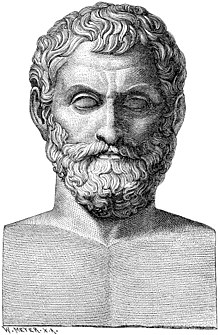
Back Thales van Milete AF Thales von Milet ALS Thales de Mileto AN طاليس Arabic طاليس ARY تاليس ARZ Tales de Mileto AST Fales (Miletli) AZ Thales BAN Thales BCL
Thales of Miletus | |
|---|---|
 Posthumous portrait of Thales by Wilhelm Meyer, based on a bust from the 4th century | |
| Born | c. 626/623 BC |
| Died | c. 548/545 BC (aged c. 78) |
| Era | Pre-Socratic philosophy |
| Region | Western philosophy |
| School | Ionian / Milesian |
Main interests | |
Notable ideas | |
Thales of Miletus (/ˈθeɪliːz/ THAY-leez; Ancient Greek: Θαλῆς; c. 626/623 – c. 548/545 BC) was an Ancient Greek pre-Socratic philosopher from Miletus in Ionia, Asia Minor. Thales was one of the Seven Sages, founding figures of Ancient Greece.
Beginning in eighteenth-century historiography,[1] many came to regard him as the first philosopher in the Greek tradition, breaking from the prior use of mythology to explain the world and instead using natural philosophy. He is thus otherwise referred to as the first to have engaged in mathematics, science, and deductive reasoning.[2]
Thales' view that all of nature is based on the existence of a single ultimate substance, which he theorized to be water, was widely influential among the philosophers of his time. Thales thought the Earth floated on water.
In mathematics, Thales is the namesake of Thales's theorem, and the intercept theorem can also be known as Thales's theorem. Thales was said to have calculated the heights of the pyramids and the distance of ships from the shore. In science, Thales was an astronomer who reportedly predicted the weather and a solar eclipse. The discovery of the position of the constellation Ursa Major is also attributed to Thales, as well as the timings of the solstices and equinoxes. He was also an engineer, known for having diverted the Halys River.[2] Plutarch wrote that "at that time, Thales alone had raised philosophy from mere practice to speculation."[3]
- ^ Cantor 2022.
- ^ a b Russell, Bertrand (1945). A History of Western Philosophy. Simon & Schuster.
- ^ Dunham, William. Journey Through Genius: The Great Theorems of Mathematics. p. 6.